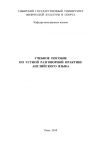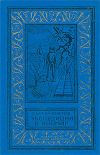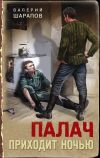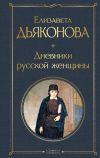Текст книги "Participle, Gerund and Infinitive"
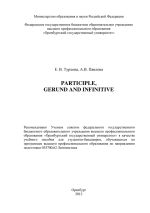
Автор книги: Евгения Турлова
Жанр: Учебная литература, Детские книги
сообщить о неприемлемом содержимом
Текущая страница: 1 (всего у книги 8 страниц) [доступный отрывок для чтения: 2 страниц]
Турлова Е.В.
Participle, Gerund and Infinitive = Причастие, герундий и инфинитив. Учебное пособие
Введение
Учебное пособие “Participle, Gerund and Infinitive” имеет своей целью систематизацию и обобщение теоретического и практического материала по теме «Неличные формы английского глагола: причастие, герундий и инфинитив» для формирования элементов коммуникативной компетенции, развития речевых грамматических навыков. Данное учебное пособие предназначено для занятий по дисциплине «Практическая грамматика первого языка» для студентов-бакалавров 1 курса очной формы обучения по направлению 035700.62 – Лингвистика, профиль «Теория и методика преподавания иностранных языков и культур» во 2 семестре.
Понимание, усвоение, приобретение навыков владения грамматическими категориями глагола, в особенности неличными формами, представляют наибольшие трудности в овладении и совершенствовании использования английского языка.
Учебное пособие состоит из пяти частей. Каждый раздел включает в себя краткое изложение грамматического материала и упражнения. Материал каждой части структурирован по принципу поэтапной работы над грамматическим феноменом. Последовательность упражнений соответствует последовательности изложения грамматики. Кроме того, каждый раздел содержит речевые упражнения (Speech Exercises) с последующим анализом грамматический явлений. Каждый раздел рекомендовано начинать с упражнений аналитического характера: Analyze the form of… State the function of… и т.п. с предварительным изучением соответствующего теоретического материала по теме. Упражнения тренировочного характера Choose the proper form… Use the appropriate form… Transform the sentences и т.п. могут быть выполнены на занятиях или даны для самостоятельной работы.
После выполнения упражнений основного раздела (подраздела) рекомендуется перейти к упражнениям Speech Exercises. Часть этих упражнений можно дать учащимся для самостоятельной работы с последующей проверкой. Упражнения творческого характера, направленные на развитие навыков употребления изучаемого материала в речи (Make up sentences… What would you say if you took part in the following short dialogues… и т.п.), необходимо выполнять на занятиях под контролем преподавателя.
1 The non-finite forms of the verb (The verbals)
1.1 General Notion
The verb has finite and non-finite forms, which are also called verbals. The verbals do not express person, number or mood. Therefore they cannot be used as the predicate of a sentence.
e. g. He does his home-work. (does – finite form of the verb, it expresses 3rd person, singular, present tense, active voice, indicative mood, non-perfect, non-continuous)
e. g. Watching TV he does his home-work. (watching – non-finite form of the verb, it does not express person, number or mood)
Like the finite forms of the verb the verbals have tense and voice distinctions, but their tense distinctions differ greatly from those of the finite verb.
There are three verbals in English: the participle, the gerund and the infinitive.
In Russian we also have three non-finite forms of the verb – причастие, деепричастие, инфинитив.
1.2 The characteristic traits of the verbals
The verbals have the following characteristic traits:
1) they have a double nature, nominal and verbal – the participle combines the characteristics of a verb with those of an adjective; the gerund and the infinitive combine the characteristics of a verb with those of a noun;
2) the tense distinctions of the verbals are not absolute (like those of the finite verb), but relative; the form of a verbal does not show whether the action it denotes refers to the present past or future; it shows only whether the action expressed by the verbal is simultaneous with the action expressed by the finite verb or prior to it:
e. g. I am glad to see you. (the action expressed by the infinitive is simultaneous with the action expressed by the finite verb; the action of being glad and the action of seeing are simultaneous)
e. g. I am glad to have seen you. (the action expressed by the infinitive is prior to the action expressed by the finite verb; the action of being glad is prior to the action of seeing);
3) all the verbals can form predicative constructions, a predicative construction is a construction consisting of two elements:
– a nominal element (noun or pronoun);
– a verbal element (participle, gerund or infinitive).
The verbal element stands in predicate relation to the nominal element, i.e. in a relation similar to that between the subject and the predicate of the sentence. In most cases predicative constructions form syntactic units, serving as one part of the sentence (complex object, complex subject).
• They sat down to supper, Manston still talking cheerfully.
Они сели ужинать; Мэнстон продолжал весело разговаривать.
Manston still talking cheerfully is a predicative construction with a participle; the participle talking stands in predicate relation to the noun Mansion, which denotes the doer of the action expressed by the participle.
4) in the sentence a verbal may occur:
a) singly, i. e. without accompanying words:
She… went away smiling.
То decide is to act.
b) in phrases, i. e. with one or several accompanying words (an object or an adverbial modifier to the verbal). The phrases form syntactic units serving as one part of the sentence.
A phrase should not be confused with a predicative construction: between the elements of a phrase there is no predicate relation as it does not include a noun or pronoun denoting the doer of the action expressed by a verbal:
• The windows of the drawing-room opened to a balcony overlooking the garden. Окна гостиной выходили на балкон, с которого был виден сад.
• She tried to tranquillize him by reading aloud. Она пыталась успокоить его тем, что читала ему вслух.
c) in predicative constructions:
• My mistress being dead… I had to look out for a new place.Так как моя хозяйка умерла, мне пришлось искать другое место.
• There is no mistake about his being a genius. He может быть никакого сомнения в том, что он – гений.
• She heard him unbar the door and go out into the yard. Она слышала, как он отодвинул засов и вышел во двор.
Table 1 – The use of the verbals in a sentence

2 The Participle
2.1 General notion
The participle is a non-finite form of the verb which has a verbal and an adjectival or an adverbial character.
There are two participles in English – Participle I and Participle II, called the Present Participle and the Past Participle.
Participle I is formed by adding the suffix – ing to the stern of the verb.
As has already been stated, the participle has a verbal and an adjectival or adverbial character.
Its adjectival or adverbial character is manifested in its syntactic functions, those of attribute or adverbial modifier.
Table 2– Double nature of the Participle

In Modern English Participle I has the following forms:
Table 3 – Forms of the Participle Active Voice Passive Voice Expresses an action

2.2 The tense distinctions of the participle
Participle I Indefinite Active and Passive usually denotes an action simultaneous with the action expressed by the finite verb; depending on the tense-form of the finite verb it may refer to the present, past, or future.
When reading The Pickwick Papers, one can't help laughing. When reading The Pickwick Papers, I couldn't help laughing. When reading The Pickwick Papers, you will roar with laughter.
Participle I Perfect Active and Passive denotes an action prior the action expressed by the finite verb.
Mr. Bumble, having spread a handkerchief over his knees… began to eat and drink.
They were, indeed, old friends, having been at school together.
Having already been informed that he always slept with a light in the room, I placed one of the two lighted candles on a little table at the head of the bed…
It should be noted that a prior action is not always expressed by Participle I Perfect: with some verbs of sense perception and motion, such as to see, to hear, to come, to arrive, to seize, to look, to turn and some others, Participle I Indefinite is used even when priority is meant.
Turning down an obscure street and entering an obscurer lane, he went up to a smith's shop.
Свернув на темную улицу и войдя в еще более темный переулок, он подошел к кузнице.
Hearing a footstep below he rose and went to the top of the stairs. Услышав шаги внизу, он встал и вышел на лестницу.
Participle II has no tense distinctions; it has only one form which can express both an action simultaneous with, and prior to, the action expressed by the finite verb.
• His sister's eyes fixed on him with certain astonishment obliged him at last to look at Fleur.
Взгляд сестры, устремленный на него с некоторым недоумением, заставил его, наконец, взглянуть на Флер.
• I was reminded of a portrait seen in a gallery.
Мне вспомнился портрет, который я видела в картинной галерее.
In some cases Participle II denotes an action referring to no particular time.
• He is a man loved and admired by everybody.
2.3 The voice distinctions of the participle
Participle I of transitive verbs has special forms to denote the active and the passive voice.
• When writing letters he does not like to be disturbed.
• Being written in pencil the letter was difficult to make out.
• Having written some letters he went to post them.
• Having been written long ago the manuscript-was illegible.
Participle II of transitive verbs has a passive meaning, e. g. a broken glass, a caged bird. Participle II of intransitive verbs has no passive meaning; it is used only in compound tense-forms and has no independent function in the sentence unless it belongs to a verb which denotes passing into a new state, e. g. a withered flower, a faded leaf.
Exercises on the form of Participle I.
Exercise 1. Read the following sentences and analyze the form of participle I.
A. 1. I kept silence for a little while, thinking of what Stroeve had told me. 2. He looked… like a man, who has fallen into the water with all his clothes on, and, being rescued from death, frightened still, feels that he only looks a fool. 3. She was lying in the dark, listening to a piano being played several rooms away. 4. Lisa walked back, wishing to get home in time to cook the dinner. 5. Sally saw the advertisement of a play being acted at the neighboring town. 6. Through the open door came a low, groaning sound, being issued out of the dark mist which covered shore and sea alike. 7. She is working in a laundry on the East Side, trying to keep her child's body and soul together.
B. 1. Having tried various topics of conversation… I asked her to tell me who all the people at table were. 2. She walked down the aisle, not changing her expression, and went to the tail of the plane and sat down there. 3. He started the motor and drove off, waving gaily, to go towards his parents' house … 4. He found the studio without difficulty, having equipped himself, from the hotel letter-rack, with a folding map of Paris. 5. …having inquired the way from one of the group of youths lounging outside the Valley Ice Cream Saloon, he (Andrew) set out for the dentist's house. 6. He went out quickly, shutting the door behind him. 7. She didn't return with us, having been asked to a supper party…
Exercise 2. State whether the action expressed by Participle I is prior to or simultaneous with the action of the finite verb (predicate).
1. Three nights later, Theresa having announced that she would be out for the evening, quickly arranged to have dinner with his mother. 2. But I wasn't listening, absorbing the atmosphere of canvases I now knew so well… 3. "Twenty-five minutes past five," said Mr. Rycrolf glancing at the clock. 4. "Tea," I said, setting the big white cup … in front of him. 5. Buttoning her raincoat up to her throat and knotting a scarf round her hair she went to Victoria Street. 6. Getting up, I ran impulsively across the room and flung my arms round her neck. 7. Waking as the sun crept over his pillow, he yawned, sat up and perceived that another day had arrived.
Exercise 3. Choose the proper form of participle I in brackets.
1. "Nonsense," said Caroline in reply… "You'll see. Ten to one she's left a letter (confessing, being confessed) everything." 2. (Turning, having turned) slowly, holding on to the wall, he dragged his way back into his room. 3. The following evening, (refusing, having refused) Elliot's telephoned order to fetch me; I arrived quite safely at Mrs Bradley's house. 4. (Pushing, having pushed) the people aside, he made his way through the crowd. 5. And for a moment they all three stood silently (looking, being looked) at one another. 6. Quickly (taking, having taken) her handkerchief, she hid her face in it and began to sob brokenheart-edly. 7. (Entering, having entered) his own room, he returned speedily with a heavy bound volume.
Exercise 4. Translate what is given in brackets using participle I in the appropriate form.
1. (Закрыв) the door with only the lightest slam, they went out together. 2. Julia sat eating rolls and drinking coffee in her room next morning, (думая) what she should do. 3. "Come along, quickly," said Nick (держа) the door of the driving cabin, "you're coming too." 4. He got up from his chair and (подойдя) to a shelf brought me a large album. 5. I kept silence for a while, (думая) of what Stroeve had told me. 6. When she had finished she sat (уставившись) in front of her for some minutes.
2.4 Syntactic functions of Participle I
Participle I has the following functions in the sentence:
1) an attribute:
Here is the telegram announcing his arrival. Вот телеграмма, извещающая о его приезде.
• Не came up to the crying child. Он подошел к плачущему ребенку.
2) an adverbial modifier:
a) of time:
As an adverbial modifier of time participle I may be preceded by the conjunctions when, while:
• When listening to her I understood that she was upset. Слушая ее, я понял, что она расстроена;
b) of cause:
• Not knowing his new telephone number I could not get in touch with him.
Так как я не знал его нового телефона, я не мог связаться с ним;
c) of manner and attending circumstances:
• For a moment they stood silently looking at one another.
Какое-то мгновение они молча стояли, глядя друг на друга.
• Не ran up to her, smiling happily.
Он подбежал к ней, счастливо улыбаясь;
d) of comparison:
As an adverbial modifier of comparison the participle is always preceded by the conjunctions as if, as though.
• He peered at me, as if not recognizing.
Он уставился на меня, как будто не узнал меня;
e) of concession:
• Не could not catch up with them though working very hard.
Он никак не мог догнать их, хотя и занимался очень напряженно;
f) of condition:
• Driving at this speed, we'll be there in no time.
Если мы поедем с такой скоростью, мы будем там очень скоро;
3) a parenthesis:
• Frankly speaking, you are wrong. Откровенно говоря, вы не правы.
• Putting it mildly, she was rather rude. Мягко говоря, она была довольно груба;
4) a part of the complex subject, the complex object, the nominative absolute participial construction:
a) the complex object:
The complex object consists of a noun in the common case or a pronoun in the objective case and participle I. The complex object is used after:
– the verbs of physical sense perception (to see, to hear, to feel, to watch, to notice, etc.):
• She watched the children playing in the garden. Она наблюдала, как дети играют в саду;
– the verbs of causative meaning (to get, to set, to leave, to have, etc.):
• Don't keep her waiting. He заставляйте ее ждать;
– the verbs of liking or disliking (to like, to want, to hate, etc.):
• I hate you talking like that.
Мне не нравится, как вы это говорите;
b) the complex subject:
The complex subject consists of a noun in the common case or a pronoun in the nominative case and participle I. It is used with the verbs of sense perception in the passive voice.
• Two people were heard quarrelling. Слышали, как два человека ссорились;
c) the nominative absolute participial construction:
It consists of a noun in the common case or a pronoun in the nominative case and participle I. Nominative absolute participial construction has the function of an adverbial modifier:
– of attendant circumstances:
• He ran into the room, his eyes shining. Он вбежал в комнату с сияющими от счастья глазами;
– of cause;
• It being a hot day, they went to the river. Так как день был жаркий, они отправились к реке;
– of time (occasionally): This having been settled, Bart left them. Когда все было улажено, Барт их оставил.
Table 4 – Syntactic functions of Participle


Exercise 1. Read and translate the following sentences. Pay attention to the function of participle I.
1. At last she left smiling and blowing a kiss from the door. 2. Desmonde came with me to all the matches returning jubilant, to our customary Saturday luncheon. 3. He drove very fast with one hand as though not carrying whether he lived or died. 4. Her aunts sat side by side on the sofa glancing at each other. 5. She stood for a moment fumbling in her bag for her key; then the door opened and vanished inside. 6. Chambers sat watching her till she was out of sight. 7. I walked down to the beach to bathe, and my uncle, having something to do in the town, walked part of the way with me. 8. Driffield worked at night, and Rosie, having nothing to do, was glad to go out with one or other of her friends. 9. I sank down on the sofa, suddenly realizing what had happened. 10. A tenant had made inquiries concerning the house, wishing to rent it.
Exercise 2. Complete the following sentences using participle I in the function of an attribute (A), an adverbial modifier (B), a parenthesis (C).
A. 1. He saw a man… 2. He came up to the child… 3. He went along the street… 4. The room was crowded with students … 5. There were people … 6. He caught sight of a girl… 7. He received a telegram … 8. Don't be very noisy, you'll wake up the child …
B. a) of time:
1. He wrote the letter… 2. When… I visited all the museums there. 3. While … you must be very attentive. 4… I realize that it was wrong. 5… I met a friend of mine.
b) of cause:
1. He kept silence … 2. He found the hotel without difficulty … 3. She didn't return with us … 4. He wasn't listening … 5… they rang again.
c) of manner or attending circumstances:
1. She walked down the hill … 2. He went out quickly … 3. He laughed embarrassed … 4. He stood there … 5. He leant on the windowsill…
d) of comparison:
1. He flung himself his arms round his granny's neck as if … 2. He looked round as if … 3. He raised his head as if … 4. He looked at her with entreaty as though…
e) of concession and condition:
1. Though … I could not help smiling. 2. Though … will be there in time. 3. Though … she tried to look calm. 4… you'll catch up with the group.
С. 1. I… you are the last person I expected to see here. 2… we have only his word for it. 3… it is not at all unusual. 4… it was a horrifying thing to happen.
Exercise 3. Read the following sentences and analyze complex objects with participle I.
1. I overheard Dale saying something about it. 2. Then she heard the stranger laughing quietly, and his footsteps came across the room. 3. He found her watering some plants; her face expressed her surprise at his unusual presence. 4. At his home, he let himself in, and to his surprise, found his wife coming towards him in the hall. 5. They could hear the Invisible Man breathing. 6. Mike saw him standing in the doorway. 7. Then her charming lace grew eager and glancing round Young Jolyon saw Bosinney striding across the grass. 8. She found herself waking from sleep and crying, but what she was weeping for she had no idea at all. 9. I saw him walking briskly through the crowd … 10. She could hear Bart moving about outside, whistling as he worked.
Exercise 4. Read and translate the following sentences. Speak on the verbs after which complex objects with participle I are used.
1. He noticed a girl standing listlessly by a pillar and he slowed his pace. 2. I thought I saw something moving along the track. 3. But he found his traps waiting for him in the porter's lodge. 4. I opened the door with extreme reluctance and found Morton standing outside. 5. The four soldiers noticed Christian watching them. 6. She ran up the drive … and I heard her fumbling for the key. 7. From where she stood she could hear everything going on at once. 8. I heard the guards moving behind us. 9… their ears spread wide to hear the first noise that would send them rushing into the bush. 10. It set him thinking.
Exercise 5. Transform the following sentences into sentences with complex objects with participle I.
Model: I could see that Dave was still standing in the doorway. – I could see Dave standing in the doorway.
1. As Nick came up to Toby he turned and saw that Michael was watching them from the other side. 2. He found that the old man was still sitting grim in the darkness. 3. He could see that a man was standing on the pavement. 4. When he opened the window he heard how the birds were singing in the garden. 5. In a minute or two I noticed that her eyes were stealthily peeping at me over the top of the book. 6. I could feel that the room was rocking under my feet. 7. I noticed that now his eyes were resting on me with a faint smile of amusement.
Правообладателям!
Данное произведение размещено по согласованию с ООО "ЛитРес" (20% исходного текста). Если размещение книги нарушает чьи-либо права, то сообщите об этом.Читателям!
Оплатили, но не знаете что делать дальше?
